An Experimental Argument
Ethan’s Lipton’s Outer Space Odyssey Toward a Sustainable Life
Ethan Lipton has assembled a creative family of musicians and designers who have worked with him on a series of projects in New York and around the country. David Zinn has designed sets and costumes and Leigh Silverman has directed Lipton’s plays for over a decade, from 100 Aspects of the Moon in 2005 to the musical Tumacho in 2016 with New York City’s Clubbed Thumb. Lipton has found a creative home at the Public Theater since his membership in the 2008 inaugural class of the Emerging Writers Group. A commission from his Emerging Writers Group experience led to his 2011 show No Place to Go, about an earthling who escapes to Mars. In February 2017, Lipton returned to Joe’s Pub with a play-with-music, a concert with a message, accompanied by many of his creative family members, to take another track at extraterrestrial storytelling with his particular Lipton edge.
I first spoke with Lipton in 2016 about his quirky musical Tumacho. Later that year, I wrote about a Philadelphia workshop performance of his The Outer Space, a song cycle with a framing story of a husband and wife who change their lives by leaving Earth and joining a Martian colony—she loves the calm and her colony neighbors and he misses the city.
After experiencing his newest show again several months later when it settled into its two month Joe’s Pub run, we talked about the piece, where it fits in his work, and what makes him laugh.
Outer space seemed like an opportunity to look at [mundane] things with a little sense of awe, and a sense of silliness, and a depth of feeling.
Martha: Where do you place The Outer Space in the body of your work? Are you stepping back to something that you’ve played with before? Are you refining a style?
Ethan: I’m trying to go deeper into a place that I have gone to before. No Place to Go was the first time, after ten years of playing music and close to twenty years of writing plays, that I tried to combine the two.
Martha: You’re going deeper with The Outer Space.
Ethan: This piece works a little bit differently than No Place to Go. That was first person; this is third person. There’s less narrative and less plot. It’s a journey through a logical argument, an experiential argument with oneself. Form-wise, it’s definitely a follow-up or a deepening of what I was trying to do.
When I did No Place to Go, I wasn’t sure that I would ever do that kind of thing again. It’s so specific. And then this story was called into being.
Martha: Talk to me about the impulse for this one. Did you want to revisit outer space?
Ethan: I really didn’t want to revisit outer space; I kind of tried not to. Then it seemed like the best way to talk about this idea of people trying to figure out how to create a sustainable life together.
One of the things that a big metaphor does is it allows you to see mundane things in a slightly elevated way. Outer space seemed like an opportunity to look at those things with a little sense of awe, and a sense of silliness, and a depth of feeling.
Those are things I like to play with in general, and essential to this story about a person wrestling with himself, trying to get his head right in a place that doesn’t feel like a good fit.
Martha: I loved your choice to create a kind of ragtag space colony—the particular neighbors, outcasts with their own agendas.
Ethan: It was a DIY colony. Like people who remove themselves from or never expose themselves to big rural places, these characters are both forward thinking and backward thinking, sometimes adventurous and risk taking. Those people really seem like aliens or people from the past. I like that they were both futuristic and past-oriented.
Space is often treated as a kind of pristine atmosphere. If the future is not dystopian, it’s often treated as pure. This piece treats space much more like the everyday.
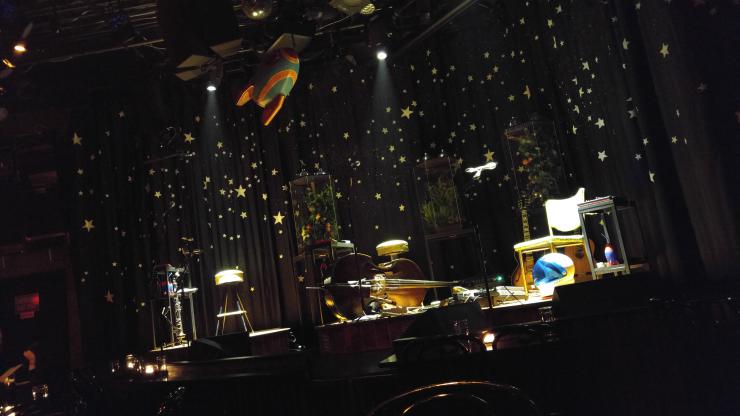
Martha: The set seemed to be to be an adolescent’s bedroom, a kid who was interested in space, with press-on reflective decals on the walls. Was that the goal?
Ethan: I was not part of the original conversation between David Zinn, the master of set and costume, and director Leigh Silverman, who I have been collaborating with on the project for a long time. They pulled the design out of the text and out of our sensibility as a band, which Leigh has described as “rock and roll meets The Muppets.” There is some childlike or simply immature impulse running through most of my work.
The issues in the work feel very grown up, very middle of life, and this version of space amps up the childlike-ness and the wonder. It’s helpful to make the room a room you’re happy to be in while you’re listening to this story about semi-competent middle-aged people.
Martha: The piece has a serious tone that is not flippant or ever snarky.
Ethan: It mattered a lot to me that it was not making the people in outer space too easy a target, you know? I wanted to make it clear that the challenge of trying to find equanimity in outer space what the husband’s problem.
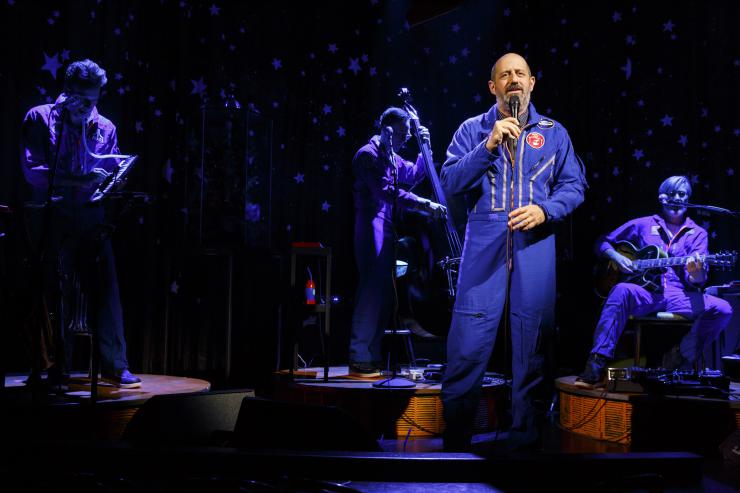
Martha: The resolution of the story underscores that it really is at root a marital relationship story that happens to be taking place in in a space colony. At root it’s somebody just growing up, committing, making a decision.
Ethan: A relationship between a couple is really many, many relationships, with other people in their lives, and with themselves. That was some of the territory that we were trying to look at without boring or depressing people too much.
Martha: I noticed that there isn’t a set list in the program. Your creation is somewhere between musical and cabaret. Was that a choice on your part?
Ethan: Sure, a set list would make things a little easier for them. The piece asks people to do a little bit of work, to do the math. That’s my little gesture towards wanting people to know that they’re going to have to do a little bit of work.
Martha: Do you like your space suit costume? Does this take you back to childhood?
Ethan: When Leigh first told me about the space suit idea, it took me a minute. Now, I love what it means. We now talk about the hardship of having to go through the rest of life without our space suits; it’s really a satisfying onesie.
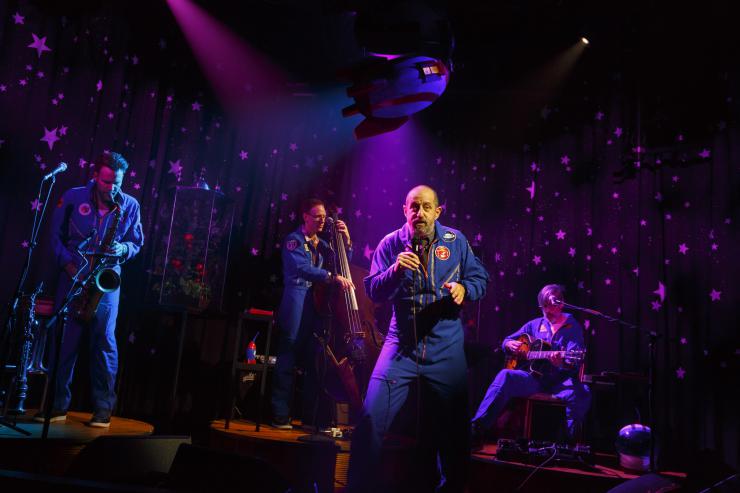
Martha: Let’s talk a bit more about the developmental process. This piece came out of the Kimmel-Joe’s Pub Theater Residency Program in 2015. I know you already had theatrical home relationship with the Public as part of the inaugural class in the Emerging Writers Group. How did residency happen?
Ethan: It was very kind of casual and unexpected. We had played the Kimmel Center with No Place to Go in 2014, and Jay Wahl, the Producing Artistic Director, approached me to be part of a series that included performance and story narrative. Six or eight months later, Jay called to talk about creating a residency program. I referred him to Shanta Thake at Joe’s Pub, who commissioned me to write No Place to Go as part of the New York Voices program and had done the very thing that Jay was hoping to do. Shanta and the Pub curated most of that first residency—a couple of Philly artists and artists Shanta worked with from New York. I was fortunate to be invited to that first year.
I brought the band down with me. No Place to Go had followed our usual process: I would write the songs and bring them to my colleagues (Vito Dieterle, Eben Levy, and Ian Riggs), and we would work on them as a quartet arranging them. They would write their own parts. But with this residency, I went down with one song and we worked together generating. I came out with four or five of the songs that are in the show and we were able to work on those with the band.
We did the residency, and seven or eight months later we did an in-house workshop that the Public put together, with twenty-nine hours of rehearsal with Leigh Silverman to push the project down the road. At that point, the Public wanted to do it, and the Kimmel Center wanted to present an early version. The Kimmel put together one more workshop in August 2016, and in December we put it on its feet. We had an intensive week and a half in New York before we started previews. A relatively short gestation period for a project.
Martha: How does it feel doing a theatrical run?
Ethan: It’s a little exhausting doing seven shows a week. My constitution is basically a writer’s constitution, so times when I’m performing all the time I’m a little adrift. We did thirty performances of No Place to Go in 2012, and now we’re doing forty-five of this one. And it’s just a great, amazing opportunity to be in that building, you know. As an eighteen-year-old freshman at UCLA in the Department of Theater, Film and Television, I never could have imagined that I would be singing a show that I had written in the Public Theater for this kind of a run.

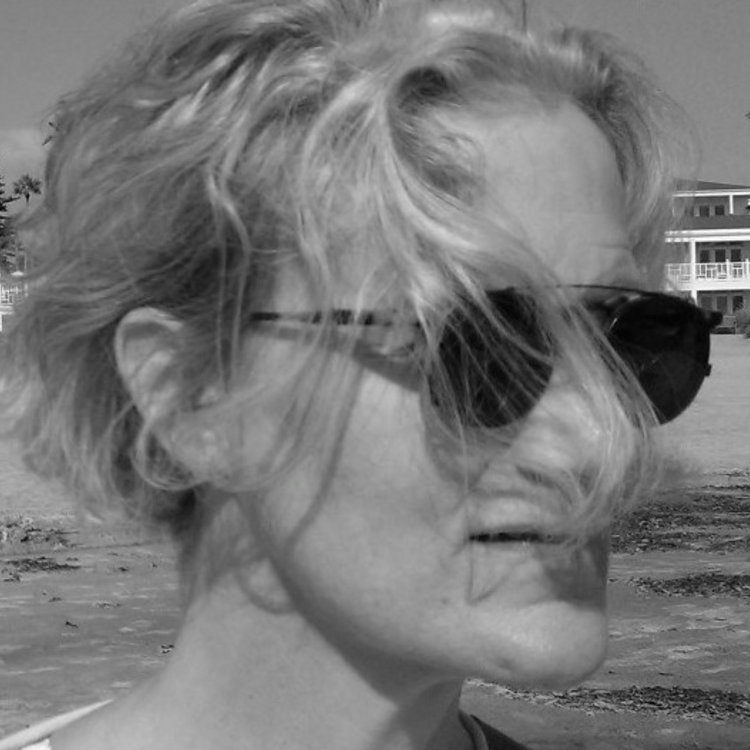
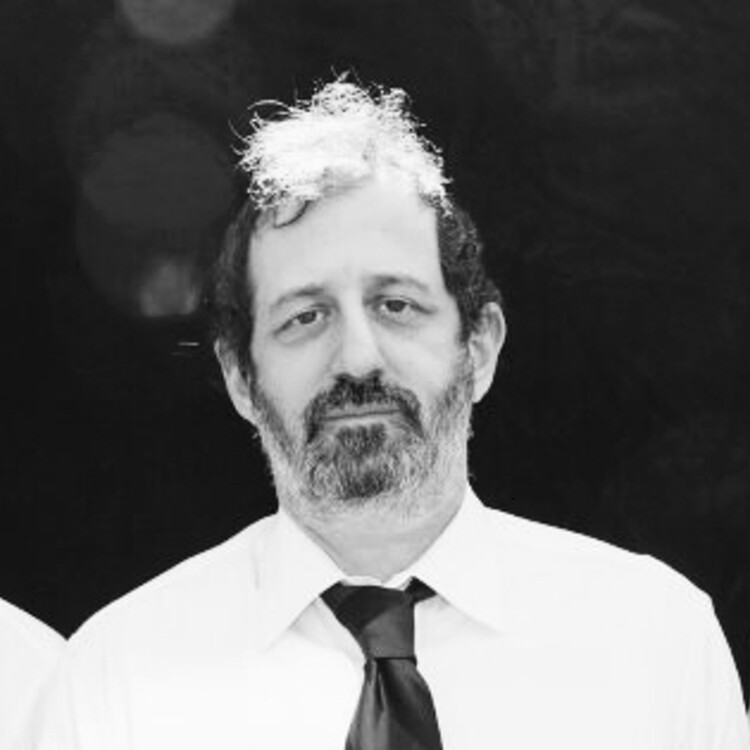
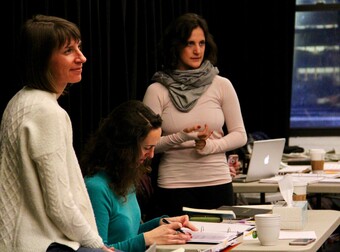

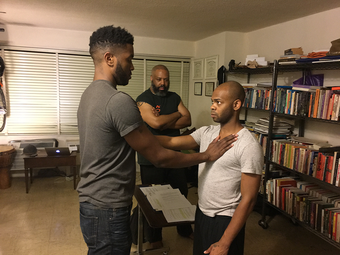

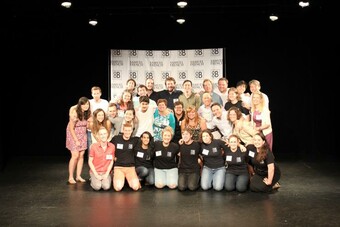
Comments
The article is just the start of the conversation—we want to know what you think about this subject, too! HowlRound is a space for knowledge-sharing, and we welcome spirited, thoughtful, and on-topic dialogue. Find our full comments policy here
"...a framing story of a husband and wife who change their lives by leaving
Earth and joining a Martian colony—she loves the calm and her colony
neighbors and he misses the city."
I sure hope the name of the colony was "Green Acres"! (In any case, I'm sure it is the place to be.)
Seriously (well, sort of) their must be something (escapist irony?) in the air (space?) because a couple of years ago I needed a break from my more serious writing and wrote a (thus far unproduced) one-act (so far) called "Mars Sucks!" about the CEO of a company called (not SpaceX but) SpaceY (motto: "Because it's There"!) who along with his family and many others founds the first Martian colony... only to find that their teenage kids would rather be back on Earth lounging on the beaches of sunny California!
P.S. I see I spelled "there" as "their". Damn.
In any case, great article and I hope someday to see the play/song cycle "The Outer Space" -- it sounds great!
By the way, Is it just me, or upon reading the clause "...really a satisfying onesie" did others also immediately have the following mental converstation pop into their head?:
Man #1: "I had the greatest sex last night!"
Man #2: "A threesome?"
Man #1: "No."
Man #2: "Oh. Just the two of you, huh? I guess she must have been really hot!"
Man #1: "Actually there was nobody with me. But it was a really satisfying onesie!"